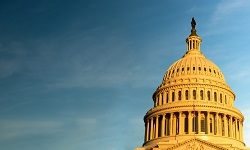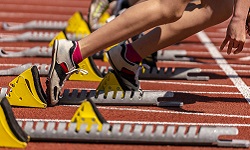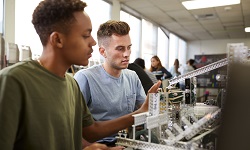 Hill Update: HASC Subcommittees Complete FY23 NDAA Markups; House Appropriations Committee Releases Markup Schedule for FY23
Hill Update: HASC Subcommittees Complete FY23 NDAA Markups; House Appropriations Committee Releases Markup Schedule for FY23
Subcommittees of the House Armed Services Committee completed markups of their respective portions of the FY23 National Defense Authorization Act this week. The full committee markup is scheduled for Wednesday, June 22. Several provisions in the bill will support university-based scientific research.
The HASC’s Subcommittee on Cyber, Innovative Technologies, and Information Systems completed its markup hearing on Wednesday. The subcommittee’s bill, which was adopted unanimously, includes proposals to create biomanufacturing capabilities and facilities; enable research into new generations of chemicals and materials; support patentable inventions; encourage collaboration between government, universities, and industry to promote innovation in navigation and timing technology; and strengthen support for test and evaluation measures. The HASC’s Subcommittee on Intelligence and Special Operations also adopted its bill by voice vote yesterday. The subcommittee’s bill includes language on enhancing counterintelligence oversight of foreign threats to classified research.
Subcommittees of the Senate Armed Services Committee are scheduled to hold their markups for the Senate’s version of the FY23 NDAA on Monday, June 13. The full Senate committee will meet on Wednesday, June 15. The Senate committee and subcommittee markups will be closed to the public.
On overall FY23 appropriations, Senate Appropriations Committee Vice Chair Richard Shelby (R-AL) told reporters yesterday that lawmakers will probably need a continuing resolution to keep the government funded beyond September 30. He suggested that legislators could still reach a deal on FY23 appropriations before the November midterm elections.
Meanwhile, House Democrats are moving ahead with holding markups for FY23 spending bills, beginning next week on June 15, and concluding on June 30. The full committee and subcommittee markup schedule can be found on the House Appropriations Committee’s website.
 FEATURED RESOURCE: FY23 Funding Briefs - Read AAU’s budget recommendations for the federal agencies and programs that are vital to the strength of the government-university partnership that fuels our economy, creates jobs, strengthens national security, and improves health.
FEATURED RESOURCE: FY23 Funding Briefs - Read AAU’s budget recommendations for the federal agencies and programs that are vital to the strength of the government-university partnership that fuels our economy, creates jobs, strengthens national security, and improves health.
 AAU, Associations File Amicus Brief Arguing Student-Athletes Are Students, Not Employees
AAU, Associations File Amicus Brief Arguing Student-Athletes Are Students, Not Employees
AAU joined the American Council on Education and 11 other higher education associations in submitting an amicus brief to the 3rd U.S. Circuit Court of Appeals in Johnson v. NCAA arguing that “intercollegiate athletics is not a business but rather a mosaic of programs that, at their core, enrich students’ educational experiences.” The brief urges the court to find that student-athletes in colleges are not employees, but students who receive a range of educational benefits from intercollegiate sport – and that forcing colleges and universities to treat student-athletes as employees would create a host of significant problems.
Filed in 2019 by a former Villanova University football player, Johnson v. NCAA seeks to determine whether NCAA Division I student-athletes in all sports at private and semi-public institutions should be considered employees of their college or university. The brief AAU joined argues that “Each of the three branches of the federal government has long understood that intercollegiate athletics belong firmly in the domain of education and do not give rise to an employment relationship.” To make its case, the brief cites previous court decisions; executive branch guidance on the application of the Fair Labor Standards Act; and laws enacted by Congress, including Title IX protections for athletes.
Forcing universities and colleges to pay student-athletes, the brief notes, would inevitably force many schools to eliminate athletics teams, especially teams that don’t generate sufficient revenue to cover the expenses of competing. It would also transform intercollegiate athletics into a business where colleges would have to compete for professional athletes who would offer their services to the highest bidder and would have little incentive to participate in campus life or academics. The brief highlights the many educational benefits intercollegiate athletics offer to student-athletes, including higher graduation rates; valuable lessons in teamwork, discipline, and sportsmanship; and opportunities to engage with the student community.
A decision from the 3rd Circuit is expected in the case later this year.
 AAU Participates in AAAS-NSF Summit on Improving Undergraduate STEM Education
AAU Participates in AAAS-NSF Summit on Improving Undergraduate STEM Education
Earlier this month, AAU and several of our member campuses participated in the 2022 IUSE Summit on “Moving from Strategy Toward Effective and Equitable Undergraduate STEM Education” organized by the American Association for the Advancement of Science and the National Science Foundation’s Improving Undergraduate STEM Education (IUSE) program. The NSF’s IUSE program provides grants to projects that take a transformative approach to improving the quality and effectiveness of undergraduate STEM education. Currently, 56 AAU institutions have 347 active NSF IUSE awards, totaling more than $195 million in funding. The summit brought together representatives from projects funded by the NSF IUSE program to share research results, learning or transformation strategies, as well as best practices for managing grants.
AAU staff participated in two workshops at the summit, which was hosted here in Washington. In the first workshop, “A STEM Reform Solar System: Academic Departments and Institutional Elements Orbiting Them,” AAU staff highlighted key findings from AAU’s IUSE grant to better understand the institutional ecosystems in which reforms to undergraduate STEM education take place. In the second workshop, “Cultivating Data-Informed Leadership for Systemic Change,” AAU staff collaborated with colleagues from the National Academies of Sciences, Engineering, and Medicine and the Association of Public and Land-grant Universities to share insights from our work with the Coalition for the Reform of Undergraduate STEM Education.
To learn more about AAU’s efforts to improve the quality of undergraduate teaching and learning in STEM fields at our member institutions, please visit the AAU Undergraduate STEM Education Initiative page on our website.
In the News
AP News: Harvard President Lawrence Bacow to Step Down Next Year – Harvard University President Lawrence Bacow announced earlier this week that he will step down in June 2023. Bacow became president in 2018. “Larry Bacow is an extraordinary leader, not just for Harvard University, but for the broader higher-education community,” remarked AAU President Barbara R. Snyder in response to the announcement.
The Chronicle of Higher Education: An Urgent Network for Ukrainian Scholars – Ukrainians have initiated a series of efforts to sustain education in their country during wartime. One such effort is the Ukrainian Global University, which connects Ukrainian students and scholars to international academic institutions and provides a “uniquely Ukrainian solution” that “centers Ukrainian voices and their perspectives.”
Del Mar Times: UC San Diego Opening Large-Scale Research Hub on Homelessness – The University of California San Diego is opening a new, nonpartisan center “to conduct critical research, synthesize and communicate findings, as well as inform local policy and action to address homelessness.” The Homelessness Hub will be located within the university’s Department of Urban Studies and Planning.
Forbes: Carnegie Mellon Ranked as Top Tech Transfer University in New Report – A new report from Heartland Forward ranks Carnegie Mellon University as the top university in the country for technology transfer; the University of Florida is ranked second. Tech transfer refers to the process of transferring research discoveries from academia to the commercial sector, where those discoveries are developed into products and services for public use.
Inside Higher Ed: A Gift or a Burden? – Congress is currently considering a provision in the pending competitiveness legislation that would require universities to report gifts of more than $50,000 from foreign entities to faculty and staff; the current reporting threshold is $250,000. AAU, along with other higher education associations, sent a letter to lawmakers earlier this year arguing that the new measure would place an undue burden on institutions.
USA Today: LGBTQ Students Consider Quitting College at an Alarming Rate. Why Mental Health Help Is Hard to Find. – According to a new survey, 92% of LGBTQ college students believe that mental health challenges have negatively affected their college experience and that nearly one in four have considered dropping out. Students cited financial barriers, difficulty making appointments, and lack of LGBTQ counselors as some of the issues preventing mental health access.
Featured Research

Rutgers Unveils New,
Sweeter Strawberry Perfect
for Dipping
Gardeners and farmers can now plant Rutgers D’Light, a new, flavorful strawberry developed by Rutgers University researchers with a unique shape – reminiscent of a Christmas tree light – that, according to one Rutgers official, makes it the “ideal strawberry for dipping in chocolate.”

How Mosquito Brains Encode
Human Odor So They Can
Seek Us Out
Researchers at Princeton University imaged mosquito brains at high resolutions to reveal that mosquitos that have evolved to exclusively bite humans use human odor to target their hapless victims.